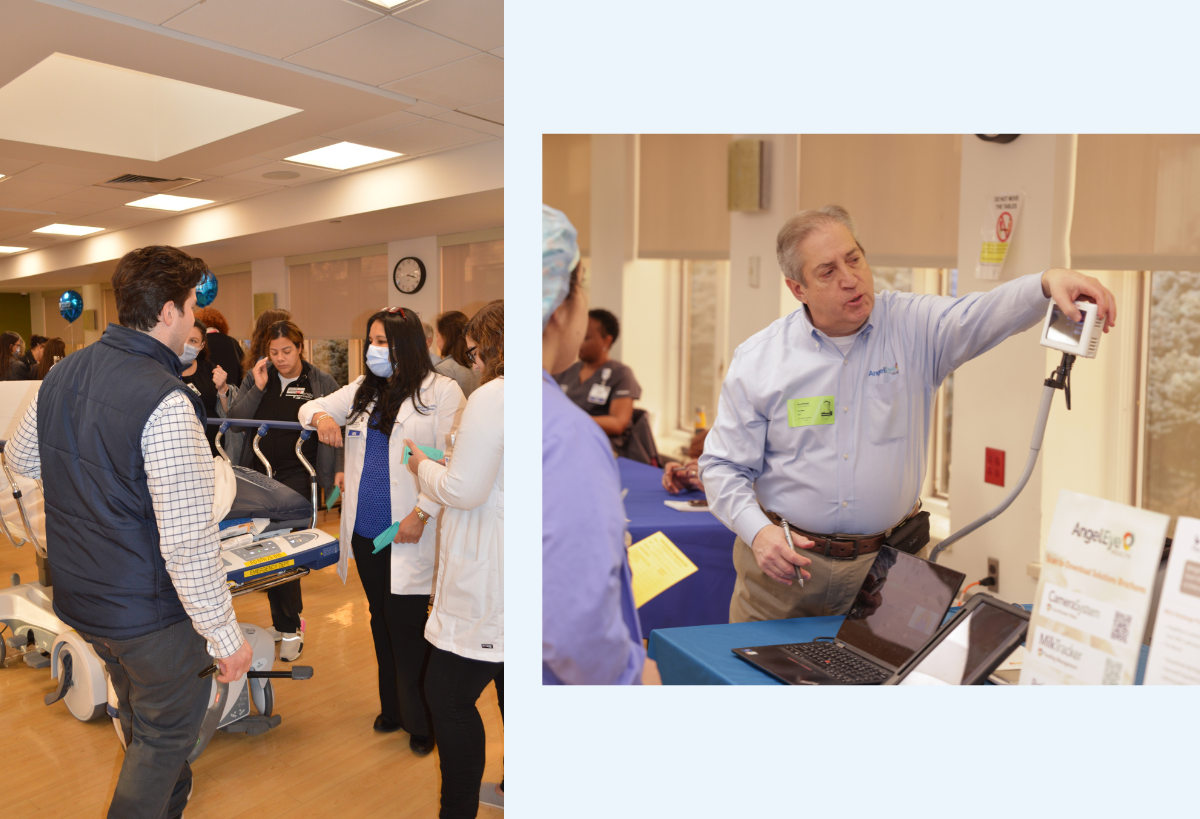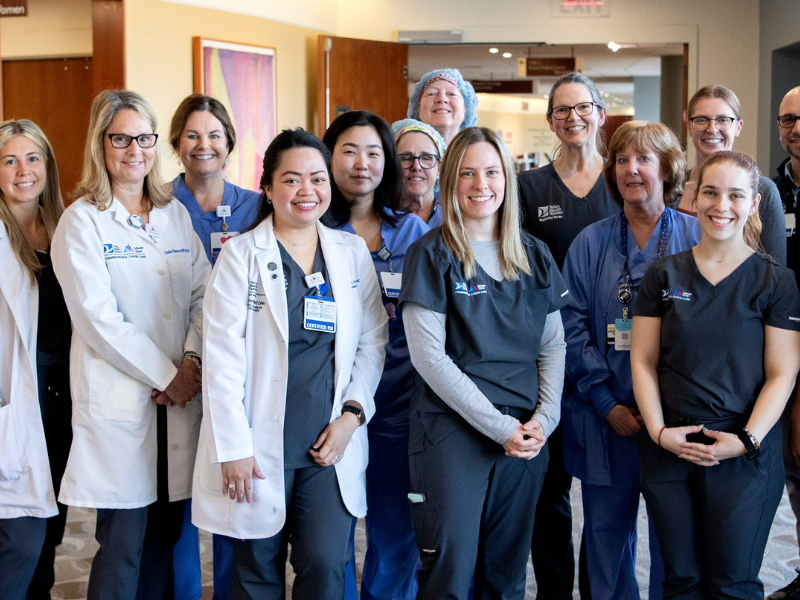NEW KNOWLEDGE, INNOVATIONS, AND IMPROVEMENTS focuses on how clinical and operational practices are based on research, evidence-based practice, and innovation.
Maternal Food Farmacy: Improving Maternal and Infant Outcomes through Nutrition
Valley’s Maternal Food Farmacy initiative aims to enhance maternal and infant health by addressing nutritional deficiencies and promoting healthy eating habits among pregnant and postpartum women. Spearheaded by Jennifer Enrique, DNP, WHNP-BC, RNC-OB, Lead Advanced Practice Nurse at The Valley Hospital, this innovative program was funded by a generous $216,000 grant from Van Houten through The Valley Hospital Foundation in 2024.
Led by a multidisciplinary team that includes Melissa Buddha, MS, WHNP-BC, Advanced Practice Nurse, Valley Medical Group (VMG), and Joshua Gregoire, MS, MPH, NEA-BC, Assistant Vice President, Quality/Performance Improvement & VMG Clinical Operations, the Maternal Food Farmacy provides comprehensive support to pregnant and postpartum women with hypertension, gestational diabetes, and other high-risk conditions. The program offers the following key components:
Nutritional Support: Participants receive two medically tailored meals per day, five days a week, from 12 weeks of gestation through six weeks postpartum. They also receive personalized nutrition plans and routine coaching from registered dietitian nutritionists.
Education and Monitoring: Participants are educated on home blood pressure monitoring and provided with support tools. They also receive guidance on accessing community resources to ensure food affordability and availability.
Collaboration and Outreach: The program partners with community organizations to extend its reach and provide additional resources and support to participants.
The Maternal Food Farmacy exemplifies Valley's commitment to addressing the multifaceted needs of its patients, particularly through innovative food and nutrition interventions. This initiative not only improves the well-being of mothers and infants, but also contributes to the growing body of research on the critical role of nutrition in maternal and child health.
New Hospital, New Technologies
In April 2024, The Valley Hospital moved from its Ridgewood campus into a new, state-of-the-art facility in Paramus. With the opening of the new hospital came many new technologies that nurses adopted through extensive training, hands-on learning, and continuous support. Here are a few highlights!
- The Nihon Kohden telemetry system for continuous cardiac monitoring
- The West-Com Nurse Call System, which provides seamless, real-time communication between patients, nurses and other healthcare staff
- New Stryker patient beds
- AUGi: A fall-prevention tool and platform that combines a hybrid sensor, artificial intelligence, computer vision, a smartphone application, an integrated smart lanyard, and Bluetooth low energy into a powerful tool to enhance patient safety
- The Centrak Safety Solutions Infant Protection System, which helps nurses and staff ensure the correct matching of patients and their infants
- The AngelEye Health CameraSystem, a live-streaming video system that allows parents to have “virtual visits” with their infants in the NICU
- The Amico ceiling lift to provide for safe patient handling

AlertGPS: Ensuring the Safety of Staff in the Field

In 2024, Valley Home Care began using the AlertGPS platform to offer emergency support and assistance for nurses and staff who visit patients in their homes.
Through both a wearable device and a mobile app, employees who encounter an unsafe situation or feel uneasy in any way are able to initiate a call for help with the press of a button. An agent from AlertGPS’s 24/7 monitoring center then speaks with the employee to assess the situation and, using real-time location tracking, is able to dispatch emergency services if needed. The employee’s manager is also alerted when a call for help is initiated.
The response from our clinicians has been very positive, with Cynthia Luer, CDE, Certified Diabetes Educator in Valley Home Care, stating, “AlertGPS makes me feel safe in all situations, like I have a personal guardian angel with me.”
Led by Maribeth Kearney, MPA, BSN, RN, CHPN, Director of Valley Hospice, and Rose Ranuro, MSN, RN, CPNP, Director of Clinical Services, Valley Home Care, the implementation of this new program is part of the larger efforts of Valley Health System’s Workplace Violence Committee, which works to ensure the safety of our employees.
Extended Recovery Unit for Post-Operative Patients
Not long after The Valley Hospital transitioned from its home in Ridgewood to the new Paramus campus, teams began to strategize ways to enhance bed capacity and optimize patient care. One solution was the Extended Recovery Unit (ERU), which opened in the hospital’s Post-Anesthesia Recovery Unit (PACU).
The ERU was designed for post-operative patients who have an anticipated discharge within 23 hours of their procedure and meet other criteria; those who are deemed eligible are identified prior to their surgery.
Collaboration and communication channels between clinical teams in the ERU, Same Day Surgery (SDS), and the PACU result in seamless transitions of care for the patient, from pre-admission through post-operative care. By allowing surgical patients to be admitted and discharged from the same platform, the ERU promotes continuity of care and a more cohesive patient experience.
In addition, the ERU contributes to maximizing hospital resource utilization and minimizing unnecessary hospital stays for patients. By decreasing the need for an inpatient bed for select surgical patients, the hospital increases bed capacity for patients who are admitted through the Emergency Department.
Admission Unit Aids in Capacity Management
In October 2024, The Valley Hospital opened a 10-bed Admission Unit for Emergency Department patients who are admitted to the hospital. Patients move to the Admission Unit once a provider makes the decision to admit them; their formal admission process is completed in the Admission Unit, and they remain in the unit until an appropriate inpatient unit bed becomes available.
The Admission Unit benefits patients and staff in several ways:
- Patients are moved out of the ED when admitted, opening up beds for incoming ED patients
- Admitted patients are moved to the right inpatient bed at the right time
- Inpatient staff are freed up for other tasks, as the admission process is completed in advance of a patient’s move to their unit
- Patients may experience a decreased length of stay
- Patients’ overall hospital experience improves
Coming Soon: A State-of-the-Art Simulation Center!
In 2024, The Valley Hospital was the recipient of a $3.1 million grant from the federal Health Resources and Services Administration. The grant will enable Valley to build and open a new Simulation Center for Valley Health System and space for the Nursing Professional Development Department. The Simulation Center will allow for new and innovative learning and skill development opportunities for our clinical staff, including the medical residents in the Graduate Medical Education program!
Focusing on What Matters Most to Aging Patients
As part of the Institute for Healthcare Improvement’s (IHI) Age-Friendly Care movement, last year, Valley Home Care (VHC) and Valley Hospice began tailoring care plans for aging patients based on how they answered the following question: “What matters most to you today?”
After attending a National Association for Home Care & Hospice (NAHC) conference and learning about the Age-Friendly Care movement, Maribeth Kearney, MPA, BSN, RN, CHPN, Director of Valley Hospice, championed this effort at Valley to help us ensure the care we provide is aligned with our patients’ personal goals, values, and preferences.
By beginning each home care and hospice visit with “What matters most to you today?” and documenting the answer, our nurses are able to prioritize what is important to the patients, such as being able to walk again to play with their grandchildren, or focusing on pain relief so they can resume their normal activities.
Encouraging conversations about what matters most fosters trust between patients, families, and care teams, leading to more informed and collaborative care decisions. As a result, VHC and Valley Hospice have seen an increase in patient satisfaction scores in the areas of Courtesy and Respect, reaching their target goals for 2024.
The Valley Hospital also piloted making this question part of the daily assessments for patients on both the geriatrics and oncology inpatient units. Due to the pilot’s success and the resulting increase in patient satisfaction scores, this initiative will be implemented hospital-wide in 2025.
The IHI’s Age-Friendly Care initiative features four evidence-based elements of high-quality care, known as the “4Ms,” for older adults: What Matters, Medication, Mentation, and Mobility.
UrgoK2 Compression Therapy for Wound Care
 To help wound care patients achieve faster healing, reduced pain, and greater comfort, Valley Home Care (VHC) clinicians are using UrgoK2 compression therapy. This system uses compression bandaging to provide consistent and effective pressure for healing wounds and managing edema on the lower extremities.
To help wound care patients achieve faster healing, reduced pain, and greater comfort, Valley Home Care (VHC) clinicians are using UrgoK2 compression therapy. This system uses compression bandaging to provide consistent and effective pressure for healing wounds and managing edema on the lower extremities.
Last year, VHC wound, ostomy, and continence nurses Janet Mantel, MA, RN-BC, APN, CWOCN, and Karen Sorkin, BSN, RN, CWOCN, initiated and trialed the use of UrgoK2 compression therapy on two patients with persistent leg wounds. As a result of the system’s unique features, including a visual pressure indicator to help ensure the correct compression is applied, as well as two-layer bandaging that allows for fewer dressing changes and better movement while staying in place, the patients were able to heal quickly and comfortably. Notably, one of the patients who had experienced complications from a leg wound for more than a year was able to heal within just seven weeks of using this new system.
Due to the success of the trial, all VHC nurses were subsequently trained on how to apply the UrgoK2 compression therapy system for wound care patients who meet specific criteria. This is one way Valley nurses are using new, innovative treatment options to help our patients achieve optimal outcomes.
